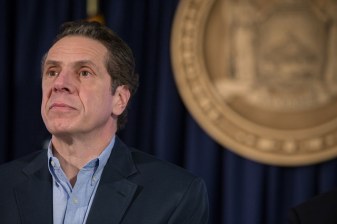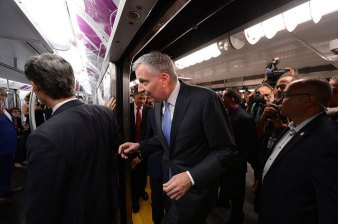You Know What’s Fundamentally Regressive? NYC’s Current Toll System

Well, a few words from Andrew Cuomo made clear that fixing NYC’s broken road pricing system won’t be on the table before next year’s statewide elections. But some opponents of congestion pricing — notably, Eastern Queens City Council Member Mark Weprin — are warming to Sam Schwartz’s toll reform plan, which calls for a uniform price on entry points into the Manhattan core, including the East River bridges and 60th Street, paired with lower prices on less congested, outlying bridges.
And so, the Times turned to former Westchester Assemblyman Richard Brodsky for a dash of his trademark fake populism:
Among former critics of ideas to toll the East River bridges, reactions to this one have been mixed. Richard L. Brodsky, a former Democratic assemblyman and a senior fellow at the Robert F. Wagner Graduate School of Public Service at New York University, said Mr. Schwartz’s plan was “a fundamentally regressive tax,” even if equity problems among the boroughs were “addressed to an extent,” at least compared with the 2008 plan.
“It will modify the behavior of the guy driving the ’97 Chevy,” Mr. Brodsky said, “but will do nothing to modify the behavior of the guy driving the 2013 Mercedes.”
It’s telling that Brodsky imagines his working-class stiff as “the guy driving the ’97 Chevy.” It’s not “the guy riding the R train” or “the gal transferring from the Q60 to the M15.” Transit commuters far outnumber car commuters in NYC and earn, on average, far less, but they never figured into his message.
Brodsky, who hasn’t held office since a failed run for attorney general in 2010, represented the wealthiest Manhattan-bound car commuters in the NYC region. He wasn’t looking out for regular Joes — he was defending free driving privileges for white collar elites earning, on average, $176,231 per year.
He also managed to obscure a core truth about NYC’s current toll system: It doesn’t work for the little guy. We are right now at this very moment living under the burden of a “fundamentally regressive” toll plan — it’s the status quo we’ve had for decades. It’s regressive that a few people in single-occupancy vehicles can clog streets and immobilize hundreds of less affluent people riding buses. It’s regressive that wealthy car owners can drive into the center of the city without paying a dime, while transit riders have no choice but to pay higher fares because the MTA capital program is backed by mountains of debt.
Reforming NYC’s road pricing system will make the regional transportation network more equitable in profound ways. It will speed up the surface transit that less affluent New Yorkers rely on, improving access to jobs. And by injecting funds into the MTA Capital Program, it will help improve the transit system without fares eating up a bigger chunk of household budgets.
The toll and fee structure in the Sam Schwartz/Move NY plan is arguably a more equitable arrangement than congestion pricing, mainly because the wealthiest borough — Manhattan — pitches in a bigger share relative to the other boroughs. A lot of the revenue from Manhattanites would come from a surcharge on yellow cab rides south of 96th Street. Move NY analyst Charles Komanoff sent in these charts showing the geographic origin of revenues under each proposal:
People like Mark Weprin look at these numbers and see the contours of a major regional transportation reform they can support. People like Richard Brodsky barely even look.
Streetsblog will be off for the holiday and back on Monday. Happy Thanksgiving, readers.




